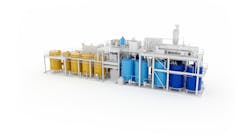Emerson reported May 30 that it’s helping Swedish clean-technology provider HaloSep optimize its process for turning hazardous, incinerator flue-gas residue from waste-to-energy plants into usable materials. Emerson’s control technology and software are being deployed at HaloSep’s plant for optimization, research and technology (PORT) in Gothenburg, Sweden, where it will manage an innovative chemical separation process that recovers valuable salt, metals and minerals from fly ash.
A subsidiary of the Stena Metall Group, HaloSep adds that on-plant solution can be built locally at a waste-to-energy plant, or placed at sites where fly ash from smaller plants is consolidated, eliminating long-range transportation costs and emissions. By providing an alternative to landfill disposal, HaloSep’s process reportedly increases the sustainability of the waste-to-energy industry.
Assessing ash
Recovering materials from difficult waste streams is an important contribution to greater circularity. There are over 2,600 waste-to-energy plants worldwide, with a disposal capacity of approximately 460 million tons of municipal waste annually. About 2-5% of the incinerated waste becomes flue gas residue known as fly ash, which is a hazardous material containing contaminants such as heavy metals, chlorides and sulfates. Millions of tons of fly ash are currently transported to landfills by truck, rail or sea, which is both costly and unsustainable.
"Because of the irregular nature of household waste, fly ash from incinerators has varying properties requiring different separation processes. Our PORT plant will analyze fly ash samples from around the world, test specific separation processes and demonstrate circular economy benefits to potential customers,” says Staffan Svensson, president at HaloSep. “Emerson’s technology and expert advice on implementing automation throughout the plant plays a vital role in optimizing these processes, which will increase the sustainability of the waste-to-energy industry.”
Scalable sequences
Emerson designed and implemented a scalable control system for the PORT facility, and worked with HaloSep to develop unique separation sequences to efficiently recycle fly ash with variable compositions. Emerson’s DeltaV DCS is ensuring the safe and efficient operation of the separation processes. Also, DeltaV Live software is providing high-performance human machine interfaces for operators, with KPIs on dashboards to provide intuitive reporting and management and supporting optimized decision-making and operational performance.
“Emerson is committed to helping customers in industries such as plastics, lithium-ion battery manufacturing and waste-to-energy generation to meet today’s growing industrial, processing and energy demands through sustainable innovations that minimize environmental impact,” says Nathan Pettus, president of Emerson’s process systems and solutions business. “Emerson’s technologies and expertise are designed to handle the complexity of HaloSep’s recycling process.”





